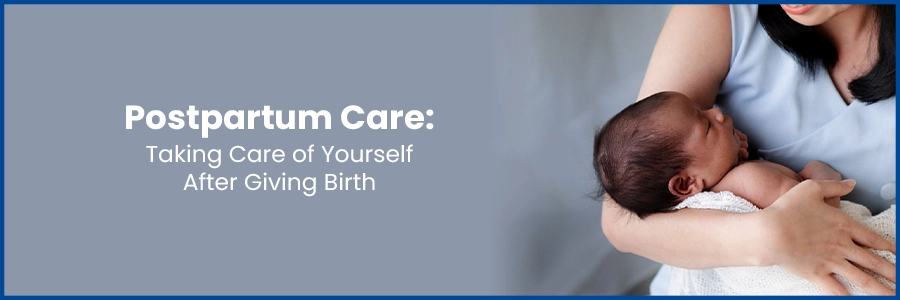
Postpartum Care: Overview
Congratulations on the arrival of your precious little one! As you begin this wonderful adventure into motherhood, it's essential to keep in mind that looking after yourself following childbirth holds just as much significance. The postpartum period, often called the "fourth trimester," is a transformative phase that requires attention, self-care, and support. This comprehensive guide'll delve into various aspects of postpartum care, providing expert insights, practical tips, and answers to frequently asked questions.
What is Postpartum Care?
The postpartum period encompasses the weeks following childbirth, during which your body undergoes significant changes as it adjusts to the new reality. Physical and emotional adjustments and the nurturing of your newborn characterize this phase.
The Importance of Self-Care
Taking care of yourself after giving birth is paramount. While your focus might naturally shift to your newborn, neglecting your well-being can have long-term consequences. Prioritizing self-care ensures that you're better equipped to care for your baby and enjoy this remarkable phase of your life.
Physical Recovery
Physical healing is a crucial component of postpartum care. Your body has undergone a remarkable transformation and needs time to recover. Focus on adequate rest, proper nutrition, and gentle exercises to aid in your recovery.
Emotional Well-being
The emotional rollercoaster that comes with motherhood is average. Hormonal shifts, sleep deprivation, and the challenges of caring for a newborn can impact your emotional well-being. Seek support from your partner, friends, and family, and don't hesitate to contact a mental health professional if needed.
Secure your health with a second opinion. Make informed decisions and book your appointment today!
Get A Second OpinionNutrition and Hydration
A balanced diet and proper hydration are essential for your postpartum recovery. Lactating mothers, in particular, require additional nutrients and fluids to support breastfeeding. Incorporate various nutrient-rich foods into your meals and stay hydrated throughout the day.
Rest and Sleep
Getting sufficient rest and sleep is a game-changer during the postpartum period. While sleep might be elusive with a newborn, prioritize short naps and rest whenever possible. Enlist the help of loved ones to take care of your baby while you catch up on sleep.
Bonding with Your Baby
The time after giving birth provides a distinct chance to create a close bond with your infant. Through skin-to-skin contact, breastfeeding, and investing quality moments with your baby, you nurture a powerful emotional link that is advantageous for both you and your little bundle of joy.
Managing Discomfort
It's normal to experience Discomfort after giving birth. Whether you had a vaginal delivery or a cesarean section, your body will need time to heal. Utilize pain relief methods recommended by your healthcare provider and practice proper wound care.
Pelvic Floor Health
Pregnancy and childbirth can impact your pelvic floor muscles. Engaging in pelvic floor exercises like Kegels can help strengthen these muscles and prevent issues like urinary incontinence.
Returning to Physical Activity
Gradually easing into physical activity postpartum is critical. Consult your healthcare provider before resuming exercise and consider activities like walking, gentle yoga, or postnatal exercise classes.
Conclusion:
The postpartum period is a time of immense change and adjustment. By prioritizing self-care, seeking support, and implementing these essential tips, you can navigate this transformative phase with confidence and grace. Remember, taking care of yourself after giving birth is a gift to yourself and your precious newborn. Embrace this journey, cherish the moments, and prioritize your well-being every step of the way.
Secure your health with a second opinion. Make informed decisions and book your appointment today!
Book an AppointmentFrequently Asked Questions
The rest you need varies, but aim for at least six weeks of focused rest and recovery.
Postpartum care is crucial for a mother's overall health, as it helps her body heal from childbirth, manage hormonal changes, and adapt to the demands of caring for a newborn.
The postpartum period typically begins immediately after childbirth and lasts about six weeks. However, the need for self-care continues beyond this time frame.
Material changes can include vaginal bleeding (lochia), breast engorgement, perineal Discomfort, and changes in body weight. Your healthcare provider can guide you through managing these changes.
Pain relief measures can include using over-the-counter pain medications (as your doctor recommended), ice packs, practising gentle pelvic floor exercises, and maintaining good posture.
Food is essential for postpartum recovery and breastfeeding. A balanced diet rich in nutrients helps support healing, energy levels, and milk production.
Maintaining a strong support network, practising relaxation techniques, getting enough rest, and seeking professional help are all critical for your mental well-being.
Yes, it's common to experience mood swings and mild sadness or anxiety, known as "baby blues," due to hormonal changes. These usually improve within a few weeks.
Suppose you experience persistent sadness, hopelessness, lack of interest, or changes in appetite and sleep patterns that last longer than two weeks. In that case, it's essential to seek professional help for possible postpartum depression.
Sleep when the baby sleeps, enlist the help of family and friends, and establish a sleep routine that works for you and your baby. Prioritize rest and self-care whenever possible.

- Cardiology 2132
- Dermatology 168
- Endocrinology 135
- ENT 97
- Fertility 217
- Gastroenterology 232
- General 478
- General-Medicine 1685
- Gynecology 169
- Hematology 85
- Infectious-Diseases 208
- Neurology 207
- Oncology 345
- Ophthalmology 65
- Orthopedics 187
- Pediatrics 83
- Procedure 72
- Public-Health 209
- Pulmonology 126
- Radiology 13
- Second Opinion 311
- Urology 294
- Wellness 600
- Woman-and-child 447
- Others 10217
Related Blogs
If you have any questions, please fill out the enquiry form or call us, and we will get back to you promptly.
040-68334455